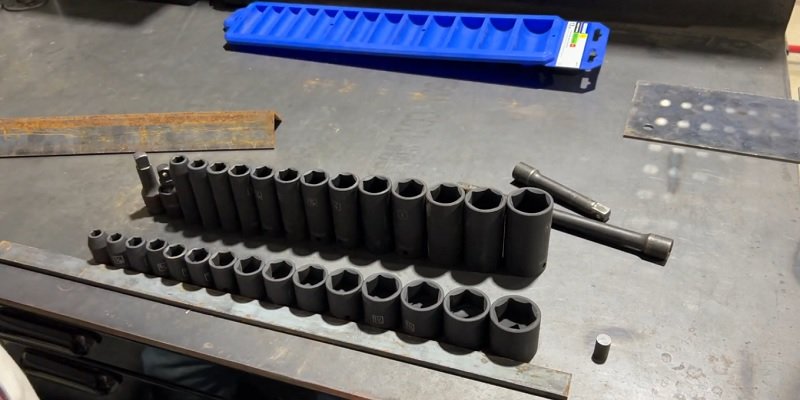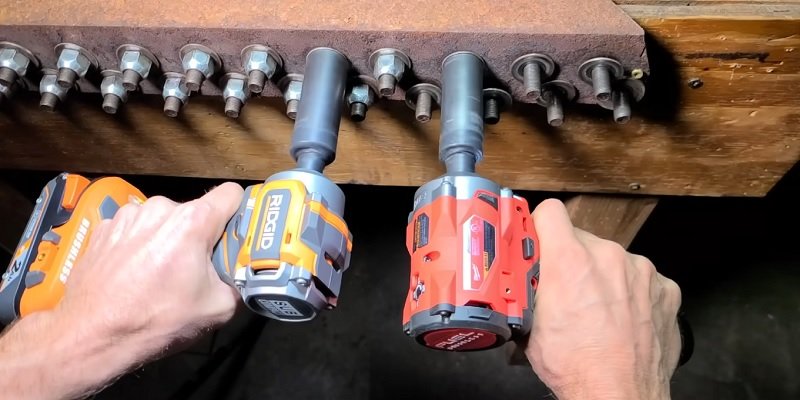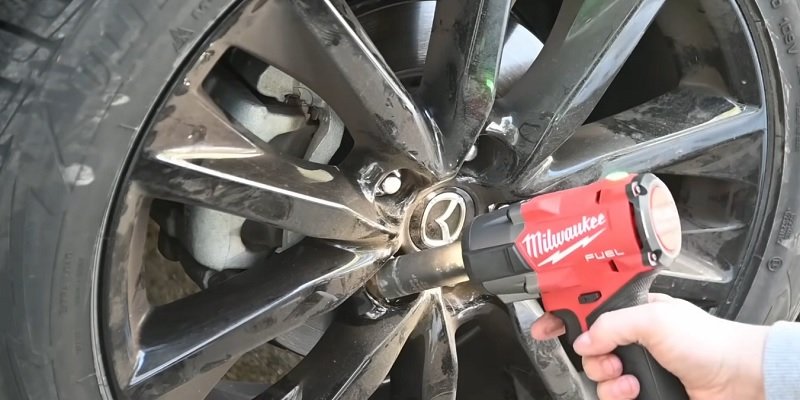Disclosure: This post contains affiliate links and I will be compensated if you make a purchase after clicking through my links. Learn More
Impact sockets are typically made of high-quality steel alloys, such as chrome molybdenum or chrome vanadium steel. These alloys provide strength and durability, allowing the sockets to withstand the high torque and impact forces exerted during heavy-duty applications.
With their unique composition, impact sockets are designed to handle the powerful blows produced by impact wrenches, ensuring secure and efficient tightening or loosening of fasteners. The steel alloys used in their construction enable impact sockets to resist deformation and maintain their shape, even under heavy loads.

What are Impact Sockets Made Of?
When it comes to understanding the construction of impact sockets, one of the key aspects to consider is the materials used in their fabrication. Impact sockets are specially designed to withstand the high torque and impacts generated by power tools such as impact wrenches. Therefore, they need to be made from materials that are durable, strong, and resistant to wear and tear.
The socket materials play a crucial role in determining the performance and longevity of impact sockets. Here are some commonly used materials in the construction of impact sockets:
Chrome Vanadium (Cr-V) Steel
This is one of the most widely used materials for impact sockets. Chrome Vanadium steel is known for its excellent strength and durability. It is a type of alloy steel that contains chromium and vanadium, which enhance its hardness and resistance to corrosion. Impact sockets made from Cr-V steel can withstand heavy use and resist deformation, making them suitable for demanding applications.
Chrome Molybdenum (Cr-Mo) Steel
Also known as Chromoly, Chrome Molybdenum steel is another popular choice for impact sockets. It is a high-strength steel alloy that contains chromium and molybdenum. Cr-Mo steel provides exceptional strength, toughness, and heat resistance, making it ideal for heavy-duty applications. Impact sockets made from Cr-Mo steel can handle intense impacts without breaking or cracking.
High Carbon Steel
High carbon steel is another material commonly used in the construction of impact sockets. It is a type of steel that contains a higher percentage of carbon, which increases its hardness and strength. Impact sockets made from high carbon steel are reliable and can handle high torque levels. However, they may be more prone to corrosion if not properly maintained.
Alloy Steel
Alloy steel is a broad category that includes various types of steel mixed with other elements such as chromium, nickel, or molybdenum. These alloying elements improve the strength, hardness, and resistance to wear of the steel. Impact sockets made from alloy steel offer superior performance and longevity, making them suitable for professional use.
In conclusion, the materials used in the construction of impact sockets are crucial in determining their durability, strength, and resistance to impacts. Chrome Vanadium steel, Chrome Molybdenum steel, high carbon steel, and alloy steel are some of the common materials used in impact sockets.
Each material has its own advantages and is selected based on the specific requirements of the application. By choosing impact sockets made from high-quality materials, you can ensure a long-lasting, reliable tool for your impact wrench.
Steel: The Preferred Material For Impact Sockets
Exploring the advantages of steel
When it comes to impact sockets, steel emerges as the undisputed champion. Renowned for its strength, durability, and reliability, steel has proven to be the ideal material for manufacturing impact sockets. The advantages of using steel sockets are abundant and highly sought after by professionals and DIY enthusiasts alike.
High-carbon steel: An ideal choice for durability
One particular variation of steel that stands out in the realm of impact sockets is high-carbon steel. High-carbon steel is specifically engineered to withstand the extreme forces and pressures exerted during impact applications. It is widely recognized for its exceptional durability and resistance to wear and tear. This makes high-carbon steel an ideal choice for impact sockets that are subjected to heavy usage, ensuring they can deliver consistent performance even under rigorous conditions.
Heat treatment techniques for optimizing strength
To further enhance the strength and durability of steel impact sockets, heat treatment techniques are employed. Heat treatment involves subjecting the steel to specific heating and cooling processes which optimize its molecular structure. This results in increased strength, hardness, and toughness, making the impact sockets even more reliable and capable of withstanding the demanding tasks they are designed for.
By utilizing high-carbon steel and implementing heat treatment techniques, impact socket manufacturers ensure that their products can withstand the immense force and torque exerted by impact tools without compromising on durability or performance. This translates into impact sockets that can handle challenging tasks efficiently and reliably, providing the users with peace of mind knowing they have a tool they can depend on.
Overall, steel triumphs as the preferred material for impact sockets due to its innate strength, durability, and reliability. Whether it’s the high-carbon variation engineered for maximum durability or the use of heat treatment techniques to optimize strength, steel impact sockets are the go-to choice for professionals and DIY enthusiasts seeking a tool that can withstand the toughest of applications. Invest in steel impact sockets, and experience the power and durability they bring to any project.
Alloy Steel: Enhancing Strength And Performance
The benefits of alloy steel in impact socket construction
Alloy steel is a type of steel that is specifically designed to enhance its strength and performance, making it the perfect material choice for impact socket construction. This type of steel is made by combining iron with various alloying elements, such as chromium, molybdenum, and vanadium. These alloying elements not only enhance the overall strength and durability of the steel but also improve its resistance to rust and corrosion.
One of the key benefits of using alloy steel in impact socket construction is its exceptional hardness. Alloy steel has greater hardness compared to standard carbon steel, which means it can withstand high levels of impact and torque without deforming or breaking. This makes it ideal for heavy-duty applications where sockets are subjected to intense pressure and force.
In addition to hardness, alloy steel also offers enhanced toughness. Toughness refers to a material’s ability to resist fractures and absorb energy before breaking. Impact sockets made from alloy steel have high toughness, allowing them to withstand repeated use without cracking or shattering. This is particularly important in industries and professions where impact sockets are constantly exposed to heavy loads and demanding tasks.
Alloys with enhanced hardness and toughness
When it comes to socket applications, different alloying elements can be added to alloy steel to enhance its hardness and toughness. These alloying elements include:
Chromium: Chromium is commonly added to steel to increase its hardness, corrosion resistance, and wear resistance. It forms a protective layer on the surface of the steel, preventing it from rusting and extending its lifespan.
Molybdenum: Molybdenum is often used in alloy steel to improve its strength, toughness, and heat resistance. It enhances the steel’s ability to withstand high temperatures and maintain its shape under extreme conditions.
Vanadium: Vanadium is known for its ability to enhance the hardness and wear resistance of steel. It forms very fine carbides in the steel’s grain structure, which improves its overall strength and durability.
By carefully selecting and combining these alloying elements, manufacturers can create impact sockets that are tailored to specific applications. For example, sockets used in automotive repairs may contain higher levels of molybdenum to withstand the high torque generated by engine components, while sockets used in construction may have increased amounts of vanadium for improved toughness in demanding environments.
Alloy steel is a superior choice for impact socket construction due to its exceptional hardness, toughness, and resistance to rust and corrosion. The addition of alloying elements such as chromium, molybdenum, and vanadium further enhances these properties, allowing for the creation of impact sockets that can withstand heavy loads and perform flawlessly in various applications.
Surface Coatings: Enhancing Functionality And Protection
Surface coatings play a critical role in enhancing the functionality and protection of impact sockets. These coatings are applied to the surface of the sockets to improve their performance, durability, and resistance to corrosion. Not only do these coatings ensure that impact sockets withstand the rigors of heavy-duty usage, but they also provide a secure grip for efficient and safe operation.
The role of surface coatings in impact sockets
Impact sockets are subjected to high levels of torque and stress during use, which can lead to wear and tear. To combat this, surface coatings are applied to impact sockets to enhance their strength and durability. These coatings act as a protective layer, shielding the underlying material from damage caused by friction, abrasion, and corrosive substances. Additionally, surface coatings can also provide a better grip, allowing users to handle impact sockets with ease and confidence.
Exploring the types of coatings used
There are several different types of coatings that are commonly used to enhance impact sockets. These coatings are carefully selected to meet specific functional requirements and provide the best performance. Some common types of coatings include:
| Coating Type | Description |
|---|---|
| Chrome | A chrome coating provides excellent corrosion resistance and a smooth, polished finish. It offers good protection against rust and other forms of oxidation, ensuring that the impact socket remains in optimal condition over time. |
| Black Phosphate | Black phosphate coatings offer high corrosion resistance and provide a rougher surface, which improves grip. These coatings are commonly used in impact sockets, as they provide excellent protection against rust and other forms of corrosion. |
| Electroless Nickel | Electroless nickel coatings provide superior hardness and wear resistance. They offer excellent protection against abrasion and can withstand high temperatures and corrosive environments. |
How coatings improve corrosion resistance and grip
Surface coatings significantly enhance the corrosion resistance of impact sockets. By providing a barrier between the socket material and external elements, such as moisture and chemicals, coatings prevent the formation of rust and corrosion. This not only extends the lifespan of the impact socket but also ensures its optimal functionality.
Surface coatings improve grip, which is essential for efficient and safe operation. The rougher texture created by certain coatings, such as black phosphate, allows for a secure grip, reducing the risk of slippage and accidents during use.
Overall, surface coatings play a crucial role in enhancing the functionality and protection of impact sockets. Whether it’s improving corrosion resistance or providing a better grip, these coatings ensure that impact sockets perform optimally even under demanding conditions.
Engineering Design And Production Process
Impact sockets are an essential tool for anyone working with heavy machinery or automotive repairs. These specialized sockets are designed to withstand high torque levels and provide a safe, secure grip on nuts and bolts. To ensure their durability and performance, impact sockets are made using a carefully engineered design and production process.
Factors Influencing the Design of Impact Sockets
The design of impact sockets takes into account various factors to ensure their effectiveness and reliability. These factors include:
Material Strength: Impact sockets are made from strong and durable materials such as chrome molybdenum steel or chrome vanadium steel. These materials possess excellent tensile strength and hardness, allowing them to withstand the high rotational forces applied during impact wrench use.
Socket Size and Shape: Impact sockets come in a range of sizes and shapes to accommodate different fastener types and dimensions. The design considers the geometry of fasteners, ensuring a perfect fit and maximum contact area for effective torque transfer.
Surface Coating: Many impact sockets feature surface coatings to enhance their performance and longevity. These coatings can include electroplating or black oxide finishes, which provide resistance against corrosion and wear.
Manufacturing Process of Impact Sockets
The production of impact sockets undergoes a meticulous manufacturing process to ensure consistent quality and performance. The steps involved in their production include:
Material Selection: High-quality raw materials, such as chrome molybdenum steel or chrome vanadium steel, are carefully chosen for their strength and durability.
Forging: The selected material is then heated and forged under intense pressure to shape it into the desired socket form. This forging process enhances the material’s structural integrity and ensures uniformity.
Machining: After forging, the sockets undergo precision machining to obtain accurate dimensions and smooth surfaces. This process involves lathe turning, milling, and grinding to achieve the desired shape and finish.
Heat Treatment: To further strengthen the sockets, they undergo a heat treatment process, which involves carefully controlled heating and cooling cycles. This treatment improves the material’s hardness and toughness.
Surface Finishing: Impact sockets receive a final surface coating or finish, such as electroplating or black oxide, to improve corrosion resistance and enhance their appearance.
Quality Control Measures to Ensure Reliability and Performance
Manufacturers employ rigorous quality control measures to ensure that every impact socket meets the required standards of reliability and performance. These measures include:
Dimensional Accuracy: Impact sockets are inspected for dimensional accuracy, ensuring they meet the specified size and shape requirements.
Torque Testing: Each socket is subjected to torque testing to verify its load-carrying capacity and confirm its ability to withstand the expected forces during use.
Hardness Testing: Impact sockets undergo hardness testing, ensuring they possess the required hardness to endure high levels of impact and torque.
Surface Coating Inspection: The surface coating or finish of impact sockets is carefully inspected to verify its uniformity, adherence, and resistance against corrosion.
Functional Testing: To validate their performance, impact sockets may undergo rigorous functional testing under simulated operating conditions to ensure they can handle the intended tasks reliably.
Frequently Asked Questions On What Are Impact Sockets Made Of?
What Are Impact Sockets Made Of?
Impact sockets are typically made from chrome-molybdenum steel, also known as chrome-moly steel. This type of steel is chosen for its excellent strength and durability, allowing it to withstand the high torque and vibrations produced by impact wrenches. The chrome-moly steel construction ensures that impact sockets can handle heavy-duty applications without breaking or deforming.
Read Also: What Type of Socket Should Be Used With an Air Impact Wrench
Final Thoughts
To sum it up, impact sockets are made from a variety of materials, including chrome molybdenum steel and chrome vanadium steel. These alloys provide durability and strength, making them ideal for heavy-duty applications. Additionally, the heat treatment process enhances their performance and resistance against wear and tear.
Now that you understand what impact sockets are made of, you can confidently choose the right tool for your needs. Upgrade your toolkit and tackle any job with ease!








